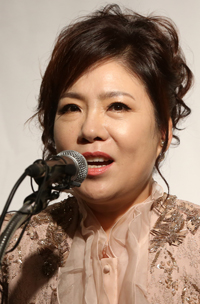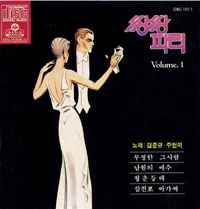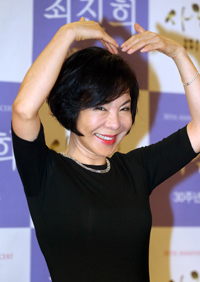- California Assembly OKs highest minimum wage in nation
- S. Korea unveils first graphic cigarette warnings
- US joins with South Korea, Japan in bid to deter North Korea
- LPGA golfer Chun In-gee finally back in action
- S. Korea won’t be top seed in final World Cup qualification round
- US men’s soccer misses 2nd straight Olympics
- US back on track in qualifying with 4-0 win over Guatemala
- High-intensity workout injuries spawn cottage industry
- CDC expands range of Zika mosquitoes into parts of Northeast
- Who knew? ‘The Walking Dead’ is helping families connect
Joo Hyun-mi, Kim Yeon-ja, Choi Jin-hee trot back to limelight
By Do Je-hae
At a time when idol groups are dominating Korean pop, veteran singers are making an unexpected comeback.
Joo Hyun-mi, who is celebrating her 30th year as Korea’s foremost ‘Trot’ musician, is renewing attention to a genre that has been losing touch with younger generation of Koreans.
Trot is the oldest form of Korean pop music developed in the years before and during Japanese occupation (1910-1945).
Since the 1990s, it has dwindled as big names like Joo and her contemporaries got older or moved abroad. Trot was widely heard and performed from the 1950s to the 1980s, the period of Korea’s growth into a modern nation after the division of the Korean Peninsula.
Trot expressed the love, sorrow and longings of the average Korean during this transitional time like no other genre, accounting for its immense popularity. Many trot masterpieces written during this period reflected the sorrow of separated families in the two Koreas.
Now in their 50s, former trot stars are returning with concerts and albums, marking more than three decades of devotion to a genre that is uniquely Korean. They sound and look better than ever.
Kim Yeon-ja
Kim Yeon-ja is celebrating her 40th anniversary next month.
After living in Japan for almost 30 years, she moved back to Korea recently following the termination of her marriage to a Japanese businessman. She made it clear during a recent press conference that personal issues will not interfere with her lifelong passion for music.
“My songs and fans continue to sustain me,” Kim said.
The 40th anniversary concert will take place on Oct. 11 at the Kimdaejung Convention Center in her hometown of Gwangju. She will release a new album this month.
Kim debuted in 1974 at the age of 15. She is a pioneer of the Hallyu boom, having launched an illustrious career in Japan in the 1980s, a time when many Koreans were not able to travel abroad.
Because she had been based in Japan since 1987, young Koreans are not familiar with her music. A versatile singer with a charming stage presence, she is also skilled in ‘minyo,’ Korean folk songs.
She’s also one of the first South Korean singers ever to hold a concert in Pyongyang — during her visit to the North Korean capital in April 2001, she personally met the then-leader Kim Jong-il and rode a train with him. She performed at a festival to celebrate the birthday of North Korea’s founding leader Kim Il-sung.
Joo Hyun-Mi
When Joo Hyun-mi debuted in 1984 with a collection of early trot hits since the 1950s, she became an instant success. Her breakthrough came a year later with ”The Rainy Yeongdonggyo Bridge,” a song about parting lovers.
Gifted with a ravishing voice and exceptional technique, she is among the most popular trot singers ever, having dominated the 1980s and 90s. With more than 40 albums to her name, she is particularly remembered for timeless numbers like “Man From Singsa-dong,” “The Rainy Yeongdonggyo Bridge,” “Unrequited Love” and “Wait a Little.”
Celebrating her 30th anniversary this month, she will be holding a series of concerts in several cities, including Seoul, Suwon, Seongnam and Daegu. She will sing at the Sejong Center for the Performing Arts in Seoul on Sept. 13-14 and release a new album on Sept. 27.
Pop diva Lee Sun-hee, who is also celebrating her 30th year as a musician, will perform as a guest during Joo’s anniversary concerts.
Joo was born to hwagyo (Korean-Chinese) parents in Gwangju. She retains a Chinese identity, which is apparent in her inclusion of famous Chinese songs like “Tian Mi Mi (very sweet)” and “Yue Liang Dai Biao Wo De Xin (moonlight expresses my heart),” “He Ri Jun Zai Lai (when is he coming),” and “Ye Lai Xiang (night-fragrant flower) by Teresa Teng in her concerts.
Her career almost didn’t happen.
“I was a pharmacist and then one day, I appeared on a singing show. That led to a life in music,” Joo said at a press conference in Seoul on Aug. 26.
Legendary trot singer Lee Mi-ja, who will launch her 55th anniversary concert series on Sept. 18, recognized Joo’s talent from the start. Lee invited Joo as a guest to her 30th anniversary concert in 1989.
Choi Jin-hee
Choi Jin-hee is synonymous with her trademark song “The Maze of Love.” Like Joo, she is feting her 30th year in music this month with a concert at Sejong Center for the Performing Arts on Sept. 9.
With the forthcoming concert, she is hoping to revive a career that has been on hold with personal troubles since 2009.
“I want to make a song that will be more beloved that ‘The Maze of Love,’” Choi said during a press conference. “There was a time when my family was adamantly against my singing career, but I kept singing because I loved it so much.”
She said that she want to collaborate with younger musicians. “I want to sing songs that can appeal to a larger audience.”
What she has in common with Joo Hyun-mi and Kim Yeon-ja, besides musical gifts, is that she has performed in North Korea.
She sang in Pyongyang three times, where “The Maze of Love” became popular.
“I felt the power of music,” Choi said. “The North Korean audiences were always very welcoming and showed great enthusiasm for my songs. I thought that ‘The Maze of Love’ could connect the peoples of the two Koreas.”
The 55-year-old debuted in 1984 and became one of Korea’s top female singers in the 1980s.












![일본 사도광산 [서경덕 교수 제공. 재판매 및 DB 금지]](http://www.koreatimesus.com/wp-content/uploads/2024/07/PYH2024072610800050400_P4-copy-120x134.jpg)


